Share
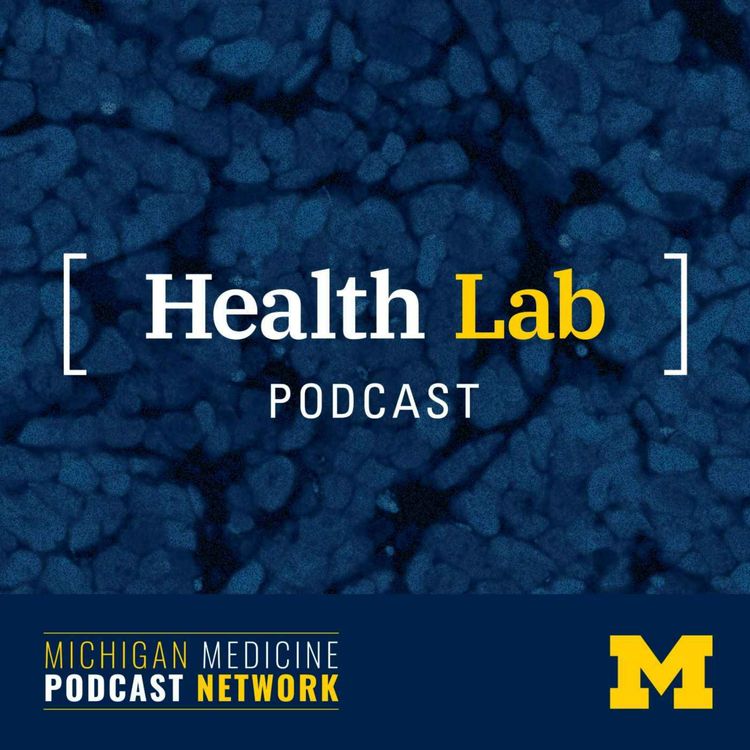
Health Lab
VA research identifies risk factors that could help prevent veteran suicide
CSREs are conducted after a veteran screens positive for potential suicide risk, as part of the VA's ongoing effort to reduce the number of veterans who die by suicide. In the ongoing effort to reduce the number of veterans who die by suicide, a study identifies key factors that predict whether veterans who received a Comprehensive Suicide Risk Evaluation, the standardized suicide risk assessment implemented nationally in the Veterans Health Administration, will go on to die by their own hands.
Additional Resources:
- Veterans Crisis Line: Accessible by phone by dialing 988 and pressing "1", by text at 838255 and by online chat.
- U.S. Department of Veterans Affairs Suicide Prevention
- University of Michigan Institute for Firearm Injury Prevention Extreme Risk Protection Order Information and Implementation Toolkit
If you or someone you know may be considering suicide, or having a mental health or addiction-related crisis, the 988 Lifeline is available for free to anyone, at all times, in both English and Spanish. Call 988 from any phone, text 988 from a mobile device, or visit their live webchat, information on available help, and live help via videophone for people who are Deaf or hard of hearing, or contact the Crisis Text Line by texting TALK to 741741.
For more on this story and for others like it, visit the Health Lab website where you can subscribe to our Health Lab newsletters to receive the latest in health research and information to your inbox each week. Health Lab is a part of the Michigan Medicine Podcast Network, and is produced by the Michigan Medicine Department of Communication. You can listen to Health Lab wherever you get your podcasts.
All Health Lab content including health news, best practices and research insights are for informational purposes only and are not a substitute for professional medical guidance. Always seek the advice of a health care provider for questions about your health and treatment options.
More episodes
View all episodes
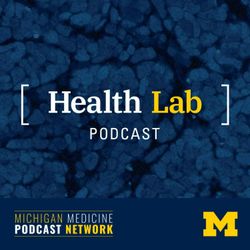
Ragweed Pollen Shows Negative Effect of Quality of Life for Some
03:35|Ragweed pollen levels correlated with worse chronic rhinosinusitis symptoms. Read the full article here.Episode TranscriptFor more on this story and for others like it, visit the Health Lab website where you can subscribe to our Health Lab newsletters to receive the latest in health research and information to your inbox each week. Health Lab is a part of the Michigan Medicine Podcast Network, and is produced by the Michigan Medicine Department of Communication. You can listen to Health Lab wherever you get your podcasts. All Health Lab content including health news, best practices and research insights are for informational purposes only and are not a substitute for professional medical guidance. Always seek the advice of a health care provider for questions about your health and treatment options.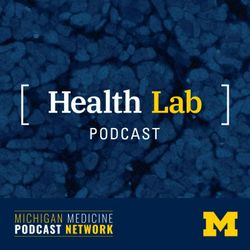
Improving UTI Care
06:24|In an age of telehealth, portal messages and direct-to-consumer care, experts come together to create testing and treatment algorithms that reduce antibiotic resistance risk for UTI's. Read the full article here.Episode TranscriptFor more on this story and for others like it, visit the Health Lab website where you can subscribe to our Health Lab newsletters to receive the latest in health research and information to your inbox each week. Health Lab is a part of the Michigan Medicine Podcast Network, and is produced by the Michigan Medicine Department of Communication. You can listen to Health Lab wherever you get your podcasts. All Health Lab content including health news, best practices and research insights are for informational purposes only and are not a substitute for professional medical guidance. Always seek the advice of a health care provider for questions about your health and treatment options.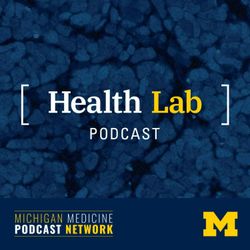
Delays in Heart Surgery for Women due to One-Size-Fits-All Criteria
03:53|Two studies showed similar disparities for different heart procedures. Read the full article.Episode TranscriptFor more on this story and for others like it, visit the Health Lab website where you can subscribe to our Health Lab newsletters to receive the latest in health research and information to your inbox each week. Health Lab is a part of the Michigan Medicine Podcast Network, and is produced by the Michigan Medicine Department of Communication. You can listen to Health Lab wherever you get your podcasts. All Health Lab content including health news, best practices and research insights are for informational purposes only and are not a substitute for professional medical guidance. Always seek the advice of a health care provider for questions about your health and treatment options.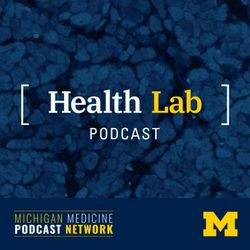
How Student Debt is Impacting Nursing
04:54|Potential limits on borrowing for a nursing education could affect decisions to stay in the profession or seek advanced training.Episode TranscriptFor more on this story and for others like it, visit the Health Lab website where you can subscribe to our Health Lab newsletters to receive the latest in health research and information to your inbox each week. Health Lab is a part of the Michigan Medicine Podcast Network, and is produced by the Michigan Medicine Department of Communication. You can listen to Health Lab wherever you get your podcasts. All Health Lab content including health news, best practices and research insights are for informational purposes only and are not a substitute for professional medical guidance. Always seek the advice of a health care provider for questions about your health and treatment options.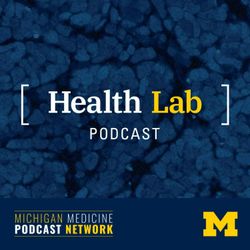
Private Equity Investment into IVF
04:03|In a recent paper published in JAMA, researchers find that over 50% of IVF cycles in the United States are now done at fertility clinics affiliated with private equity firms. Read the full article here.Episode TranscriptFor more on this story and for others like it, visit the Health Lab website where you can subscribe to our Health Lab newsletters to receive the latest in health research and information to your inbox each week. Health Lab is a part of the Michigan Medicine Podcast Network, and is produced by the Michigan Medicine Department of Communication. You can listen to Health Lab wherever you get your podcasts. All Health Lab content including health news, best practices and research insights are for informational purposes only and are not a substitute for professional medical guidance. Always seek the advice of a health care provider for questions about your health and treatment options.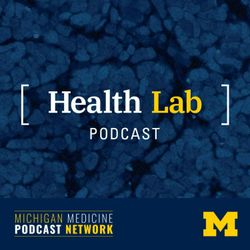
Study shows access to gender-affirming vaginoplasty improved quality of life for transfeminine patients
02:18|A recent study finds that transfeminine people 18 years and older report significant benefits across multiple metrics 12 months after the procedure.Episode TranscriptFor more on this story and for others like it, visit the Health Lab website where you can subscribe to our Health Lab newsletters to receive the latest in health research and information to your inbox each week. Health Lab is a part of the Michigan Medicine Podcast Network, and is produced by the Michigan Medicine Department of Communication. You can listen to Health Lab wherever you get your podcasts. All Health Lab content including health news, best practices and research insights are for informational purposes only and are not a substitute for professional medical guidance. Always seek the advice of a health care provider for questions about your health and treatment options.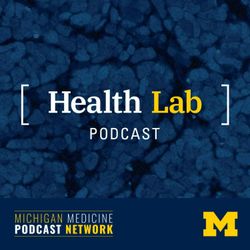
Studying Pathological Demand Avoidance
03:38|Finding resources for parents of children with PDA can provide useful tools and help with addressing behavioral challenges.Episode TranscriptFor more on this story and for others like it, visit the Health Lab website where you can subscribe to our Health Lab newsletters to receive the latest in health research and information to your inbox each week. Health Lab is a part of the Michigan Medicine Podcast Network, and is produced by the Michigan Medicine Department of Communication. You can listen to Health Lab wherever you get your podcasts. All Health Lab content including health news, best practices and research insights are for informational purposes only and are not a substitute for professional medical guidance. Always seek the advice of a health care provider for questions about your health and treatment options.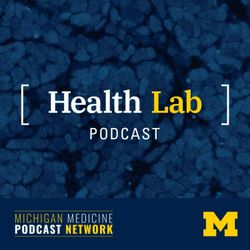
Re-Release: Experts Still Urge Fall Vaccinations for Flu, COVID
05:27|An expert update on vaccinations needed this Fall. Read the full story on Health Lab.Episode TranscriptFor more on this story and for others like it, visit the Health Lab website where you can subscribe to our Health Lab newsletters to receive the latest in health research and information to your inbox each week. Health Lab is a part of the Michigan Medicine Podcast Network, and is produced by the Michigan Medicine Department of Communication. You can listen to Health Lab wherever you get your podcasts.All Health Lab content including health news, best practices and research insights are for informational purposes only and are not a substitute for professional medical guidance. Always seek the advice of a health care provider for questions about your health and treatment options.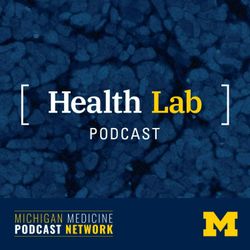
AI and Mental Health
08:04|As concern grows about online chatbots and mental health, an expert cautions about potential risk to already-vulnerable people, especially teens and young adults. Read the full article on the Health Lab website.ResourcesNational Suicide and Crisis Lifeline, 988Program for Risk Evaluation and Prevention Early Psychosis ClinicMore information about psychosis for parents and othersFree Online Course on Psychosis for Health ProfessionalsEpisode TranscriptFor more on this story and for others like it, visit the Health Lab website where you can subscribe to our Health Lab newsletters to receive the latest in health research and information to your inbox each week. Health Lab is a part of the Michigan Medicine Podcast Network, and is produced by the Michigan Medicine Department of Communication. You can listen to Health Lab wherever you get your podcasts. All Health Lab content including health news, best practices and research insights are for informational purposes only and are not a substitute for professional medical guidance. Always seek the advice of a health care provider for questions about your health and treatment options.